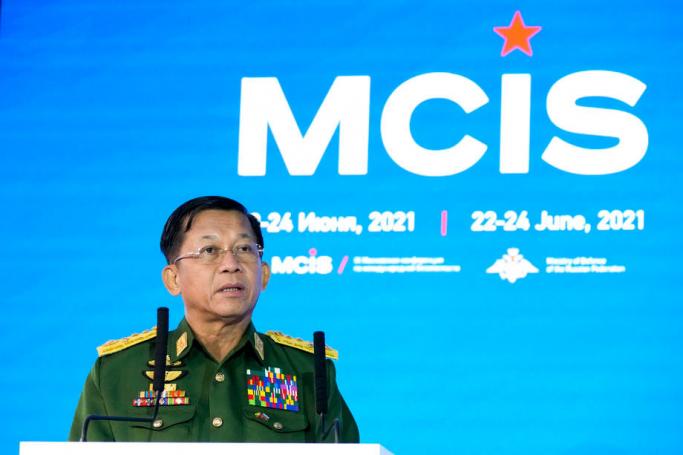Myanmar junta leader Min Aung Hlaing recently held the first cabinet meeting of the year, on February 2, and talked about the sectors that would be prioritized in 2022.
Three priority sectors
At the meeting the junta made a statement about the three tasks they would prioritise in 2022: to improve the economy; to set up a genuine, disciplined multi-party democracy through the general election scheduled for 2023; and to form an all-inclusive defence system.
Min Aung Hlaing said conscription with a one to two-year term of military service will be implemented. “If we do not have a defence capability, our country will be assaulted by the others”, he said.
The economy will improve
In the 2021 to 2022 financial year (FY) the trade surplus was over 677 US$ million according to preliminary statistics. There were exports of 15.36 US$ billion and imports of 14.69 US$ billion, resulting in a trade surplus of US$ 677 million. But, in reality this did not cover the whole economy because the Military Council’s data was one-sided.
According to the Myanmar Economic Monitor of January 2022 by the World Bank Group, signs of economic stabilization were found. However, the retail, recreation and transport sectors remain about 30 percent below their pre COVID-19 levels.
The report stated, “Weaknesses in Myanmar’s supply and demand are obstacles to business. According to an October 2021 survey, for 80% of businesses sales have plunged to an average of 59% since January 2021 before the coup”. The World Bank warns there has been continuous national currency depreciation and the inflation rate increased to 7.3% in September 2021.
Although taxation reached 6.9% of GDP in 2021, it has fallen by 45% in the coming fiscal year meaning there are likely to be financial limitations. It was estimated that Myanmar’s economy could shrink by 18% by the end of the 2021 FY and grow by 1% and stabilize during September 2022. But the estimate’s accuracy will depend on how the COVID 19 situation evolves, the effects of conflicts, foreign currency exchange and financial constraints. In addition, it will depend on whether there are disruptions to services like electricity, logistics and the internet.
The junta hopes for an improvement in the economy based only on the trade surplus, even though the only reason there was a trade surplus was due to the sanctions preventing foreign imports.
Can a genuine, disciplined multi-party democracy be implemented?
Coup leader Min Aung Hlaing said that his 2022 objective would be to do his best to implement a genuine, disciplined multi-party democracy. Can this goal be achieved?
His so-called multiparty democracy is questionable. In fact, his multiparty democracy means using the proportional representation (PR) system to have a broad representation of parties and ethnic nationalities. Using the PR system the military junta intends to share power with their supporters by forcibly seizing power. The Parliament even rejected the PR system because it would not suit Myanmar. The military council tried to implement this system by trying to form an electoral commission stacked with their supporters who will do their bidding and use the term multiparty democracy system instead of PR to fool the public.
Will they dare give people weapons to serve in the military
The third government priority is conscription, which has already existed for a long time, but now Min Aung Hlaing has insisted the law be implemented. Many other countries have conscription, but they are ruled by civilian governments and the military is under the control of the government.
But, military-controlled countries do not have conscription because they are afraid of them becoming too familiar with weapons and the workings of the military and then using that knowledge in a revolution. Because of this and the long-running, ongoing conflict against ethnic armed organisations (EAOs) the conscription law in Myanmar has never been implemented.
The military junta said, “We’ll face the assaults of other countries if we do not have political power”. It is questionable whether they dare give the people weapons as the anti-regime activities grow stronger and stronger. The junta would not be able to handle the consequences of angry people, who have been to some extent silenced by force, if they were armed with deadly weapons. Already now, the junta faces losing control in some areas being attacked by EAOs and local People’s Defence Forces (PDFs).
Will the military council fulfil its aims
Among the three tasks of the junta, the first one, the development of the economy, seems possible. The military council has taken control of the economic system with the help and support of private bankers. International humanitarian organisations may help keep the junta in power because they bring dollars into the country to pay for aid and put it in banks controlled by military cronies, which indirectly makes profits for the junta.
The multiparty democracy system will still be put into action by the junta without the public’s support. They have already said that they do not need public support. The military and its allied parties will continue on this path even as the spring revolution gains momentum and the rebellion against the military gets stronger.
Min Aung Hlaing is dreaming with his plan to implement conscription law. It is impossible for the military to give the young people military training and weapons for the sake of their security. Min Aung Hlaing’s talk of “defense capability and the assaults of other countries” was just aimed at nationalists. Conscription is just a way for the junta to legitimize them giving weapons to their pro-regime supporters.












